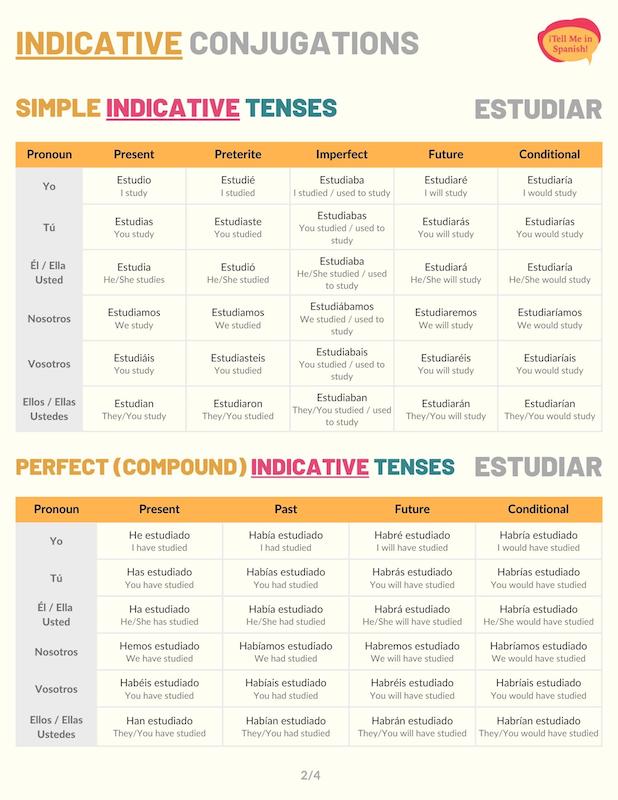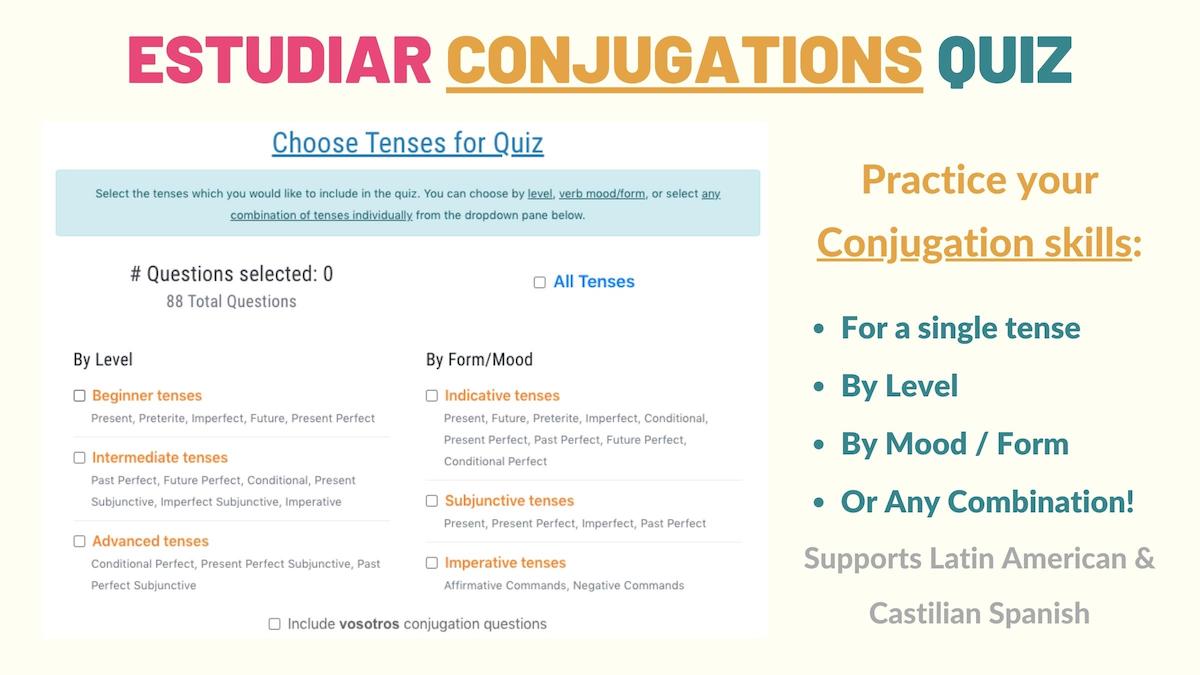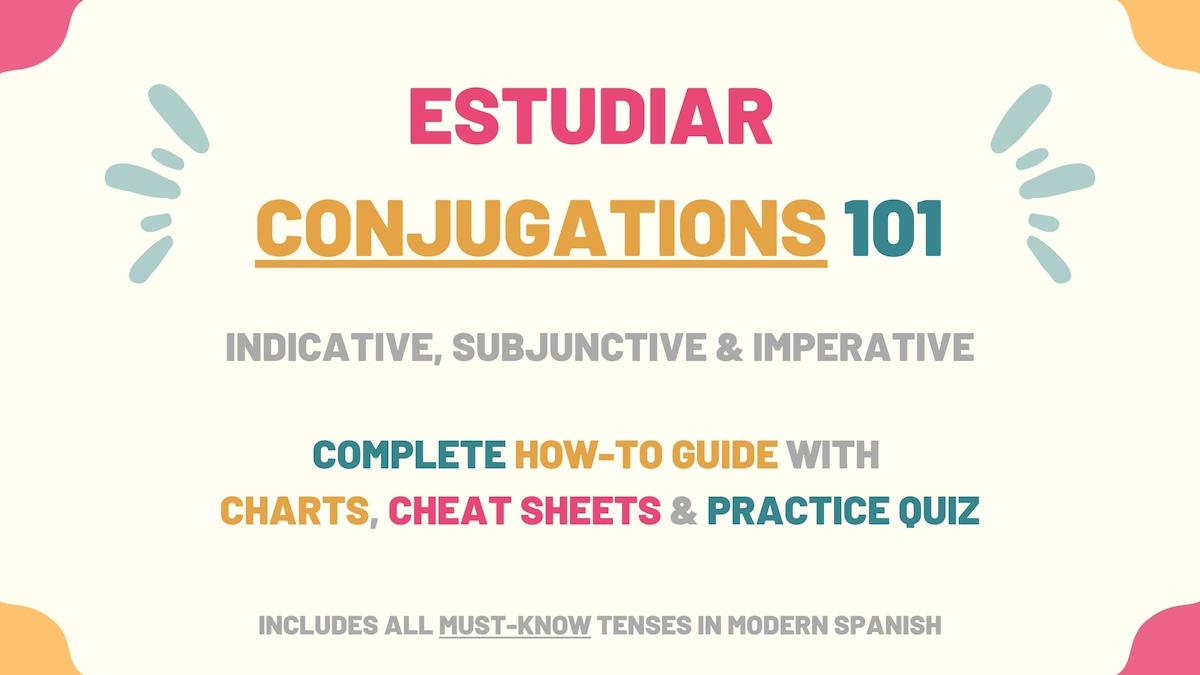Estudiar is one of the most common -AR verbs in Spanish. Because you’ll likely use it in your conversations and it can also help you practice the -AR verb group, we’ll review each estudiar conjugation chart you need to know to become fluent in Spanish. Here is what we’ll go over:
- Estudiar Overview
- Indicative Tenses of Estudiar Conjugations
- Subjunctive Tenses of Estudiar Conjugations
- Imperative (Commands) of Estudiar Conjugations
- Uses & Examples
- Download Estudiar Conjugation Tables & Uses Cheat sheets
- Estudiar Conjugation Practice Quiz
Overview of Estudiar
| Verb Characteristic | Property |
|---|---|
| Verb Type | -AR |
| Irregular | No |
| Infinitive | Estudiar |
| Gerund (Present Participle) Form | Estudiando |
| Past Participle Form | Estudiado |
| Synonyms | Aprender, memorizar, cursar, asistir. |
In Spanish, this verb means ‘to study’, ‘to look into’, or ‘to examine’. However, the following estudiar conjugation charts only include one translation to keep the tables as clear as possible. You can learn more about these applications in the Uses & Meanings section.
Indicative Conjugations of Estudiar
Present tense
The present tense conjugations of estudiar are used to explain what or how a person habitually studies. For instance: Nosotras estudiamos español.
| Person | Conjugation | Translation |
|---|---|---|
| Yo | Estudio | I study |
| Tú | Estudias | You study |
| Él / Ella Usted | Estudia | He/She studies You (formal) study |
| Nosotros | Estudiamos | We study |
| Vosotros | Estudiáis | You study |
| Ellos / Ellas Ustedes | Estudian | They study You (plural) study |
Preterite tense
Estudiar preterite conjugations are regular. With this verb, we use the preterite in Spanish to say that someone studied. If needed, you can use time markers to express when this action took place. For example: ¿Estudiaron para el examen?
| Person | Conjugation | Translation |
|---|---|---|
| Yo | Estudié | I studied |
| Tú | Estudiaste | You studied |
| Él / Ella Usted | Estudió | He/She studied You (formal) studied |
| Nosotros | Estudiamos | We studied |
| Vosotros | Estudiasteis | You studied |
| Ellos / Ellas Ustedes | Estudiaron | They studied You (plural) studied |
Imperfect tense
Estudiar imperfect conjugations allow you to refer to past study habits. You can also use the past imperfect tense to explain what or how a person studied for an extended period of time. Here is a sentence: Mis hermanos y yo estudiábamos todos los días.
| Person | Conjugation | Translation |
|---|---|---|
| Yo | Estudiaba | I studied I used to study |
| Tú | Estudiabas | You studied You used to study |
| Él / Ella Usted | Estudiaba | He/She studied He/She used to study You (formal) studied You (formal) used to study |
| Nosotros | Estudiábamos | We studied We used to study |
| Vosotros | Estudiabais | You studied You used to study |
| Ellos / Ellas Ustedes | Estudiaban | They studied They used to study You (plural) studied You (plural) used to study |
Near future
As its name suggests, when conjugated to the near future in Spanish, estudiar conveys that someone will study in the immediate future. To create this tense, use the present conjugations of ir + a + estudiar. For instance: En un rato, voy a estudiar español.
| Person | Conjugation | Translation |
|---|---|---|
| Yo | Voy a estudiar | I’m going to study |
| Tú | Vas a estudiar | You’re going to study |
| Él / Ella Usted | Va a estudiar | He/She is going to study You (formal) are going to study |
| Nosotros | Vamos a estudiar | We’re going to study |
| Vosotros | Vais a estudiar | You’re going to study |
| Ellos / Ellas Ustedes | Van a estudiar | They’re going to study You (plural) are going to study |
Future simple tense
In Spanish, the simple future tense conjugations of this verb communicate that someone will study at some future time. Check this example: ¿Qué estudiarás cuando seas grande?
| Person | Conjugation | Translation |
|---|---|---|
| Yo | Estudiaré | I will study |
| Tú | Estudiarás | You will study |
| Él / Ella Usted | Estudiará | He/She will study You (formal) will study |
| Nosotros | Estudiaremos | We will study |
| Vosotros | Estudiaréis | You (formal) will study |
| Ellos / Ellas Ustedes | Estudiarán | They will study You (plural) will study |
Conditional tense
When conjugated to the conditional tense, this verb refers to what or how someone would study. For instance: Si tuvieras más tiempo, ¿estudiarías otro idioma?
| Person | Conjugation | Translation |
|---|---|---|
| Yo | Estudiaría | I would study |
| Tú | Estudiarías | You would study |
| Él / Ella Usted | Estudiaría | He/She would study You (formal) would study |
| Nosotros | Estudiaríamos | We would study |
| Vosotros | Estudiaríais | You would study |
| Ellos / Ellas Ustedes | Estudiarían | They would study You (plural) would study |
Present perfect tense
In Spanish, the present perfect is formed with haber present conjugations + estudiado. Use these estudiar conjugations to say whether someone has studied or not. For instance: Hoy no he estudiado nada.
| Person | Conjugation | Translation |
|---|---|---|
| Yo | He estudiado | I have studied |
| Tú | Has estudiado | You have studied |
| Él / Ella Usted | Ha estudiado | He/She has studied You (formal) have studied |
| Nosotros | Hemos estudiado | We have studied |
| Vosotros | Habéis estudiado | You have studied |
| Ellos / Ellas Ustedes | Han estudiado | They have studied You (plural) have studied |
Past perfect
Haber imperfect conjugations + the past participle form of estudiar is the structure we must follow to create the past perfect tense in Spanish. These conjugations convey that someone had or hadn’t studied before a past reference point.
For example: Dijiste que sí habías estudiado.
| Person | Conjugation | Translation |
|---|---|---|
| Yo | Había estudiado | I had studied |
| Tú | Habías estudiado | You had studied |
| Él / Ella Usted | Había estudiado | He/She had studied You (formal) had studied |
| Nosotros | Habíamos estudiado | We had studied |
| Vosotros | Habíais estudiado | You had studied |
| Ellos / Ellas Ustedes | Habían estudiado | They had studied You (plural) had studied |
Future perfect
The future perfect tense of estudiar communicates that someone will have studied by or before a future moment. For example: Para mañana, el doctor ya habrá estudiado mis análisis.
| Person | Conjugation | Translation |
|---|---|---|
| Yo | Habré estudiado | I will have studied |
| Tú | Habrás estudiado | You will have studied |
| Él / Ella Usted | Habrá estudiado | He/She will have studied You (formal) will have studied |
| Nosotros | Habremos estudiado | We will have studied |
| Vosotros | Habréis estudiado | You will have studied |
| Ellos / Ellas Ustedes | Habrán estudiado | They will have studied You (plural) will have studied |
Conditional perfect
When conjugated to the conditional perfect tense, estudiar is used to say that a person would have studied. You can combine this tense with si sentences to create hypothetical scenarios. For instance: Si no fueras abogado, ¿qué otra cosa habrías estudiado?
| Person | Conjugation | Translation |
|---|---|---|
| Yo | Habría estudiado | I would have studied |
| Tú | Habrías estudiado | You would have studied |
| Él / Ella Usted | Habría estudiado | He/She would have studied You (formal) would have studied |
| Nosotros | Habríamos estudiado | We would have studied |
| Vosotros | Habríais estudiado | You would have studied |
| Ellos / Ellas Ustedes | Habrían estudiado | They would have studied You (plural) would have studied |
Progressive tenses
The progressive tenses in Spanish are built with estar conjugations + estudiando (present participle). Use these tenses to say that someone is or was studying at the moment of speaking. For example: Hace rato, los niños estaban estudiando con su papá.
| Progressive Tense | Formula | Translation Example |
|---|---|---|
| Present | Estar (present) + estudiando | I am studying |
| Preterite | Estar (preterite) + estudiando | You were studying |
| Imperfect | Estar (imperfect) + estudiando | He was studying |
| Future | Estar (future) + estudiando | We will be studying |
| Conditional | Estar (conditional) + estudiando | They would be studying |
Estudiar Subjunctive Conjugations
The subjunctive mood in Spanish refers to someone’s demands, advice, desires, expectations, doubts, recommendations, or hypothetical scenarios. In the following sections, we’ll review estudiar conjugation charts.
Present subjunctive
The present subjunctive conjugations of estudiar are regular. Use these forms to recommend, demand, or wish that someone studies something or in a certain way. For example: Mi mamá quiere que mi hermano estudie medicina.
| Person | Conjugation | Translation |
|---|---|---|
| Yo | Estudie | I study |
| Tú | Estudies | You study |
| Él / Ella Usted | Estudie | He/She studies You (formal) study |
| Nosotros | Estudiemos | We study |
| Vosotros | Estudiéis | You study |
| Ellos / Ellas Ustedes | Estudien | They study You (plural) study |
Present perfect subjunctive
To create the present perfect subjunctive, use haber present subjunctive conjugations + estudiado. This tense allows you to convey doubts or expectations about whether someone has studied. For instance: Espero que hayan estudiado.
| Person | Conjugation | Translation |
|---|---|---|
| Yo | Haya estudiado | I have studied |
| Tú | Hayas estudiado | You have studied |
| Él / Ella Usted | Haya estudiado | He/She has studied You (formal) have studied |
| Nosotros | Hayamos estudiado | We have studied |
| Vosotros | Hayáis estudiado | You have studied |
| Ellos / Ellas Ustedes | Hayan estudiado | They have studied You (plural) have studied |
Imperfect subjunctive
Conjugate estudiar to the imperfect subjunctive refers to a person’s past advice, demands, desires, or expectations about someone studying. Here is an example: Les dije que estudiaran más.
Depending on whether you’re studying Castilian or Latin American Spanish, there are different endings for the imperfect subjunctive:
Latin American Spanish version
| Person | Conjugation | Translation |
|---|---|---|
| Yo | Estudiara | I studied |
| Tú | Estudiaras | You studied |
| Él / Ella Usted | Estudiara | He/She studied You (formal) studied |
| Nosotros | Estudiáramos | We studied |
| Ellos / Ellas Ustedes | Estudiaran | They studied You (plural) studied |
Note: The estudiar conjugation chart above doesn’t include vosotros since this pronoun is not used in Latin American Spanish.
Castilian Spanish version
| Person | Conjugation | Translation |
|---|---|---|
| Yo | Estudiase | I studied |
| Tú | Estudiases | You studied |
| Él / Ella Usted | Estudiase | He/She studied You (formal) studied |
| Nosotros | Estudiásemos | We studied |
| Vosotros | Estudiaseis | You studied |
| Ellos / Ellas Ustedes | Estudiasen | They studied You (plural) studied |
Past perfect subjunctive
The past perfect subjunctive conjugations of estudiar convey that someone would have studied if a past circumstance had occurred. With this tense, you can also express regret for not studying. For example: Si hubiera estudiado más, no habría reprobado.
| Person | Conjugation | Translation |
|---|---|---|
| Yo | Hubiera estudiado | I had studied |
| Tú | Hubieras estudiado | You had studied |
| Él / Ella Usted | Hubiera estudiado | He/She had studied You (formal) had studied |
| Nosotros | Hubiéramos estudiado | We had studied |
| Vosotros | Hubierais estudiado | You had studied |
| Ellos / Ellas Ustedes | Hubieran estudiado | They had studied You (plural) had studied |
Estudiar Imperative Conjugations
The imperative mood in Spanish is used to command people to perform or not perform an activity.
Affirmative commands
The affirmative commands of estudiar allow you to command someone to study something. For example: Estudiad los verbos irregulares.
| Person | Conjugation | Translation |
|---|---|---|
| Tú | Estudia | Study |
| Usted | Estudie | Study |
| Vosotros | Estudiad | Study |
| Ustedes | Estudien | Study |
Negative commands
If you want to order someone not to study, conjugate estudiar to the negative imperative. Ya no estudies, vete a descansar.
| Person | Conjugation | Translation |
|---|---|---|
| Tú | No estudies | Don’t study |
| Usted | No estudie | Don’t study |
| Vosotros | No estudiéis | Don’t study |
| Ustedes | No estudien | Don’t study |
Meanings of Estudiar & Examples
Since you already learned how to conjugate estudiar, here are some examples of how to use this verb correctly. Depending on the sentence, this verb means to ‘study’, ‘look into’ (formal), or ‘examine’:
[Estudiar conjugated] + [complement]
Ayer estudiamos todo el día.
Yesterday, we studied all day.
Joe ha estudiado español durante dos años.
Joe has studied Spanish for two years.
Estudiaremos su propuesta y la llamaremos.
We will examine your proposal and call you.
Take Note: Spanish adverbs can work with estudiar to describe how or when a person studies. You can also use nouns to talk about the subject or thing being studied.
Download Estudiar Conjugation Charts & Uses Cheat sheet

Since estudiar is a fundamental -AR verb for Spanish beginners to learn the -AR pattern, you can download the estudiar PDF cheat sheet. It has all the conjugation tables you need to know along with examples of how to use it in your daily Spanish conversations.
Practice Quiz: Estudiar Conjugation

Congrats! You’ve successfully learned how to conjugate estudiar in Spanish. The best way to memorize all its different forms is by putting it to practice. Take the estudiar conjugation quiz to really familiarize yourself with it and see if there are any tenses you need to focus on.



